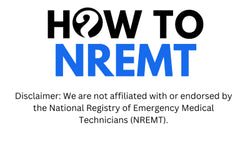Missing your NREMT recertification deadline can mean more than a lapse in credentials. It can delay employment, affect your license, and cost you valuable time and money.
That’s why understanding the pros and cons of online vs. mailed recertification applications isn’t just helpful, it’s essential. Whether you’re recertifying as an EMT, AEMT, or Paramedic, getting this step right is a big part of staying current and compliant.
In this guide, we’ll walk through each application method, step by step, and compare which one offers the most convenience, speed, and reliability. We'll also share real-world tips and highlight how your choice affects processing times and error rates, so you can focus on what matters: maintaining your certification.
Why NREMT Recertification Matters
Recertifying with the National Registry of Emergency Medical Technicians (NREMT) ensures your skills and knowledge stay sharp and up to date. Whether you're an EMT, AEMT, or Paramedic, your certification must be renewed every two years.
Skipping recertification doesn’t just risk your credentials, it could impact your ability to legally work. According to the NREMT, more than half of certified providers choose the online renewal method because it’s faster, more efficient, and allows for real-time tracking.
That said, the paper-based option still exists if that’s your preferred route. Here’s a look at both.

Submitting an Online Recertification Application
We recommend the online method if you're looking to save time and reduce paperwork. Here’s how to complete your NREMT recertification online:
1. Log in to your NREMT account
Go to nremt.org and sign in with your username and password. Reset your password if needed — don’t wait until the last minute.
2. Access your Recertification Application
From your dashboard, click on “Recertification.” Select your current certification level: EMT, AEMT, or Paramedic.
3. Enter your continuing education
Add your training hours under National, Local, and Individual categories. EMTs and AEMTs must include skills verification completed by a qualified instructor.
4. Upload documents (if required)
While not always necessary, some jurisdictions may require you to upload additional training records. Keep digital copies organized and accessible.
5. Submit payment
Fees vary depending on your level. Credit or debit card payments are accepted directly through the portal.
6. Track your submission
Once submitted, you’ll be able to track the progress of your application via your online account. Expect to receive updates by email as well.
Quick Tip: Before submitting, double-check that your training hours meet the NREMT’s minimum requirements for each section. Mistakes can delay approval.

Submitting a Mailed Recertification Application
If you prefer a physical copy or have limited internet access, you can apply by mail. Here’s how to do it right:
1. Download the correct form
Get the current recertification form for your certification level from nremt.org.
2. Fill it out carefully
Use black or blue ink, and make sure all information is legible. Include your continuing education hours, skill verification, and personal info.
3. Gather supporting documentation
Print and attach copies of certificates or course completion records. Incomplete packets are the most common cause of mail-in rejections.
4. Obtain necessary signatures
Some applications require verification by your agency's training officer or medical director.
5. Mail your application
Send your form, attachments, and payment (check or money order) to the NREMT mailing address listed on the form. Don’t forget to pay attention to deadlines.
6. Wait for processing
Mailed applications typically take 2–4 weeks to process. That doesn’t include mailing time, so be sure to send everything early.
Quick Tip: Send your packet via certified mail or include tracking to confirm it arrives at the NREMT office.

Online vs. Mailed Recertification Applications: What’s the Difference?
Here’s a side-by-side comparison to help you choose:
|
Feature |
Online Application |
Mailed Application |
|
Speed |
Immediate submission and updates |
2-4 week processing time |
|
Cost |
No postages; online payment option |
Include check and postage |
|
Accessibility |
24/7 access from any device |
Must print, sign, and mail |
|
Status Tracking |
Real-time tracking available |
No tracking unless mailed with a service |
|
Error Prevention |
Automated prompts and form checks |
Manual form; higher error rate |
Bottom Line
Online recertification is faster, easier to monitor, and has fewer chances for error. If you're in a rush or want immediate feedback, it's a better choice. According to the NREMT, the majority of mailed applications with errors are delayed due to incomplete fields or missing documents.
Final Tips for Smooth Recertification
Here’s how you can keep things on track and stress-free:
1. Start early. Aim to submit at least 30 days before your expiration date.
2. Keep records. Save digital copies of all your CE certificates — both for your records and potential audits.
3. Use the best NREMT prep. Staying sharp helps you meet recertification requirements with ease.
4. Review your CE breakdown. Double-check hours in National, Local/State, and Individual categories.
5. Follow state-specific guidelines. Some states may have extra steps beyond the NREMT requirements.

Want a Stress-Free Recertification Process? Start with Us.
We get it — recertifying can feel like a time crunch, especially when you’re juggling work, CE hours, and expiration deadlines. At How To NREMT, we make things simple.
From comparing online vs. mailed recertification applications to offering the best NREMT prep tools available, we’ve built everything around one goal: helping you stay certified without stress.
Get the resources you need now. Let’s make your recertification process smoother than ever.

